Wednesday, May 11, 2005
THE CASSANDRA PAGES HAVE MOVED
Tired of the unreliability and slow loading times at Blogger, and wanting to make some changes and add some new functionality, I'm jumping ship to TypePad. The new address is:
www.cassandrapages.com
I'm not entirely happy with the TypePad solution, because ultimately I want to incorporate my blog into a larger website and to have complete control over all of it. In the next few months I'm going to be investigating WordPress as another option, but the new address will stay the same. Please update your blogrolls, and please let me know how the new site works for you. I'm also anxious to hear of other readers' experiences with WordPress and other open source solutions.
A link to all the CassandraPages archives will also remain available via the new site.
Thank you to all my wonderful readers! I look forward to welcoming you at my new home.
7:44 PM
|
Monday, May 09, 2005
It's almost hot in Vermont this evening, after days and days of raw rainy weather. This afternoon I took a break from computer work to go outside and work in the garden, raking leaves off the perennials, inspecting plants, and then standing, hands on hips, considering possibilites for the coming growing season. Compared to last year, when we were a week into that fateful month of renting a Montreal apartment, I haven't abandoned my garden, nor do I have the same illusions about what I can handle. This current week here/week there schedule does allow for some maintenance, but I'm much more realistic now, and I know I can't keep up the way I used to with perennials, a few roses, a vegetable and herb garden, planters full of foliage and flowering annuals, and a couple of shrub borders. So today I made a decision - most of the vegetable garden is going to get mown. And that's surprisingly OK with me.
Like the decision to get rid of a lot of our books, I find the relinquishment of this once-important part of my life to be something long in coming, but fine once it actually happens. And of course it's not necessarily permanent. I've always grown some of our food, as much out of principle as pleasure. But if it's too much - and it is right now - then it's time to let go.
Tonight we had some friends over for dinner, a couple who are twelve or fourteen years younger than we are. They're recently married, and they're nesting: working hard on their old house, making a garden, making plans. It was fun to listen to their excitement - I remember feeling exactly the same way - and it was also interesting to note how much I don't feel like that now.
We've been replacing the bathroom floor during this stay in Vermont, and it's the second time around - we're taking up a floor we ourselves installed a long time ago. When we paint, it will be the second time over the surfaces. We like doing this kind of work, but it's lost the excitement it once had. At this point in my life I'm simply not into settling down, putting my imprint on things and tucking the corners around me. I'm after lightness of being, freedom of movement, a loosening of weighty responsibility so that the things that are the real priorities have more space.
Flowers, though...flowers need to stay.
10:06 PM
|
Friday, May 06, 2005
This afternoon we're heading down to Boston, through the tremulous barely-green hills, to rendezvous with some blogger friends and pay a visit to the Boston Museum of Fine Arts. Sounds like we're also heading toward a nor-easter, coming up the coast bringing gale-force winds, rain, and possibly sleet - times when one is glad for the metro). Right now, though, it's a beautiful spring day in Vermont, the trees poised on that chartreuse cusp between bud and leaf.

"TOUS CES LIVRES SONT A TOI!"
I've been thinking a lot this week about the Bibliotheque Nationale, the new national library of Quebec, which opened last weekend and is located just a short bike ride from our apartment. Over 18,000 people visited the library during its two-day, grand opening weekend; we were two of them and to say that we were thrilled would be putting it mildly. Not only is the building an architectural marvel - beautiful, original, light-filled, huge and yet intimate - it is up-to-the moment technologically, and houses a vast collection of books, journals, music, films, nearly all of which are availble for circulation. There's a language lab, a software-tryout lab, a whole floor for children, exhibition spaces, an auditorium, a cafe, and innumerable different places for reading, studying, using the library's terminals or your own, listening to music or watching films and videos, or even creating music in the innovative electronic music studio. In our brief initial tour of the building we couldn't begin to see everything, but along with the thousands of other wide-eyed, delighted visitors of every possible ethnicity, we cannot wait to return.
It's funny - I had sort of given up on libraries. Well, not given up, but resigned them to a place in the past. That's mostly because the libraries I know - even ones tat are supposedly state-of-the-art - still seem like they dont' get it, either in terms of the ambience that will draw readers to use them as destinations and refuges, or in terms of service and integration with new realities fo information-gatheirng. But here, as I walked from space to space, I saw so many people...like me. Book lovers, curled in the deep black armchairs,;bent over the honey-colored yellow-birch reading desks; deep in study at ergonomically-designed computer stations; sprawed in sofa-like chairs, eyes shut, listening to music; wrapped in afternoon sunlight in a western window, slowly turning the pages of an artbook. It was a brand-new building, and it felt like home.
A line of people waiting to sign up for their free library subscription stretched from the front door to the back wall. People walked wonderingly up and down the wide stairs in the central atrium, and spilled out of the glass elevators onto different floors: a punk couple, studded and tatooed; an African family; a distinguished set of octagenarians; even an Orthodox bishop in his black robes and silver cross, came sweeping out of the subway. And from the fourth floor balcony, I watched a young Asian mother, all in white, running back and forth below me, carrying her baby, stopping now and then to excitedly show and tell him everything she was seeing, everything he might find in his future - a future sure to be filled with many many books.
12:54 PM
|
Thursday, May 05, 2005
HIGH (part 3 of 3)
Well, they said that fraternity stuff was pretty revolting, but they didn’t really know anything about it. Neither one of them had ever been a drinker. B. started grinning and said his mother had been a teetotaler, but his father had drunk just a little now and then, which drove his mother crazy. If she found a bottle, she’d make a big show out of pouring it out. Toward the end of her life she had loosened up a bit, and at a party for his parents’ 50th wedding anniversary he remembered her drinking a little glass of wine. “I only got drunk once,” he said. “I hadn’t drunk at all in high school, and not even when I was in the Navy, which was…well…let’s just say it wasn’t the usual thing!” But on V-J Day, the navy guys had a huge celebration, and he decided he could have one drink, and after that he thought he’d have another…
“I got really drunk and really sick, of course,” he said. “And apparently I made quite a fool of myself – or so they told me. I don’t’ remember any of it. But I decided I didn’t like that feeling, so I’ve never drunk much at all since.”
He sat back and shrugged. “It all depends on how you get your jollies, and that’s different for different people. I get my jollies from up here…” – he tapped the side of his head – “from using the brain…well, the brain God gave me. Why should I want to mess that up with drugs or alcohol, when I have a perfectly good time without them? But that’s me. Other people feel differently, don’t they?”
He turned to his friend, my father-in-law, who nodded solemnly. Both of my in-laws disapproved of alcohol and the people who drank it; so far as I know there was rarely any in their house, although my mother-in-law occasionally offered a tiny glass of sherry if there were “cocktail drinkers” coming for dinner, making sure we knew it was with disdain. My father-in-law would occasionally accept a drink at a wedding reception or some other formal event, and then brag that he had poured it out in a plant pot. I always thought this was a superiority thing – drinkers were weak people who lacked self-control, or something like that – but when I finally became friends with Muslims I realized that my in-laws’ attitudes were cultural; that being Christian had far less to do with it than the fact that they had grown up in conservative Muslim/Arab culture and had absorbed the prevailing values (alcohol is forbidden in the Qu'ran). Upstanding people simply didn’t drink – - and that was the end of it.
So when my father-in-law said he’d gotten drunk once, we both raised our eyebrows. “Oh, I never told you that story?” he said. We shook our heads. “Oh yes. It was in Nabataea. Three people, himself included, were scheduled to present remarks after a dinner. He had decided, on the spur of the moment, to have some wine. “I liked it,” he admitted. ‘And then I got up to talk, and realized I’d lost my cool.” He glanced at B., who nodded solemnly, and looked affectionately and knowingly at his friend.
“Yep,” he said. “That’s it. You'd lost your cool.”
“I was really worried! So I persuaded the others to go first, and by the time they were done I managed to give my remarks. It was the first and only time in my life that happened to me, and I decided I couldn’t afford to have it happen again. I didn’t want to lose my cool.”
5:04 PM
|
Wednesday, May 04, 2005
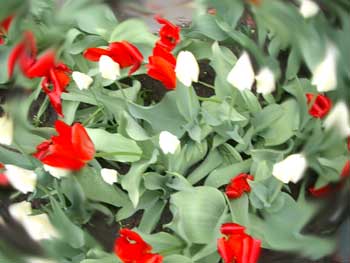
Tulips in a Westmount garden
HIGH, part 2
Somehow, talking about prep schools and colleges in the 1960s, we got onto the subject of drugs. B. turned to my father-in-law, and asked him if he’d ever smoked dope…
-----
“No, never. But I used to smoke corn – what do you call it?”
“Corn silk. Oh yes. Out in the field. Oh, you did that too?”
“Oh yes.” My father-in-law laughed.
“Did you ever make a corncob pipe? You know, where you hollow-out a piece of corncob and stick a hollow straw in there?”
M. raised his eyebrows in surprise. “No, I wasn’t that sophisticated.”
“What did you use to roll up the corn silk in?” B. asked.
“Toilet paper!”
“Did you ever smoke tobacco?”
“No! But I’ve got a story about tobacco. There was a playing field at the university in Beirut that the soldiers used to use for their practices, and we discovered that my older son, who was maybe six or seven, had been going around picking up the butts of their cigarettes and smoking them. So we confronted him and my wife said, “Those are dirty! If you want to smoke so much, we’ll do it at home.” So we took him home and had him sit down , and we gave him a cigarette – and he smoked the whole thing!”
The two old men laughed and laughed. By this time, J. and I were wide-eyed and pretty much speechless.
Unlike my father-in-law, who moves slowly, never fidgets, and, once settled, seems like a large heavy object that would just as soon stay in place calmly and indefinitely, B. is a wiry little man with twinkling eyes and is, in spite of countless physical difficulties, still bursting with energy. He’s animated and observant, and has an eager way of leaning forward toward you with interest, even mischievousness. My father-in-law still has a luxuriant head of flowing white hair, few wrinkles, and a calm, untroubled face; B. has only wisps of white hair on a nearly bald head and looks older than his years, but the two of them have similarly active minds.
B. went on to say that while he was a professor in California all the kids were trying dope, and he understood that, that was just the way kids are; what bothered him was the way some people got “hooked on it” and became lost, or got into harder drugs. He was a scientist, and he said he still felt there was some evidence that pot was just as bad for you as tobacco. It certainly distorted one’s sense of reality, he said, glancing across the table at the dubious looks on our faces.
He grinned: his son had been into pot for quite a while when he was young, he said, and the young man had been completely convinced that when he was high he had brilliant insights. So one day B. told him, “OK, I’ll smoke dope with you, and we’ll tape record our conversation.” His son said fine, so the two of them smoked – this was the one and only time B. had done it – and he made a tape, which he played back for his son the next day.
“When my son heard his ‘brilliant insights’ he was shocked, and he quit smoking then and there.”
M. shook his head, and said drugs had nearly ruined the prep school system in those days. “They’d send busloads of kids to a rock concert without any adult supervision at all!” he said, shaking his head. “I told the administration I felt this was totally irresponsible, but they didn’t pay any attention to me. I had one student, back then, who came to class the day of an exam totally stoned. He asked me for six of the examination booklets. When he turned in his exam he told me, “This is the best exam I have ever written! Please grade it right away!” When I got home I looked, and saw that he had filled all six of the books with ‘tra-la-tra-la-tra-la!’ That was it! Nothing but ‘tra-la’! All six! And when I told the headmaster about it, all he’d say was “what grade are you going to give him?” –meaning, ‘I don’t want to hear what you’re telling me so I am going to ignore it.’” He shook his head in disgust.
As former members of the generation they were discussing, with our own versions of those years, J. and I had been silent so far, listening to these unselfconscious recollections with a certain amount of amazement. It was like a time warp, listening to these familiar arguments, except that now there was no anger between us, and no need for either the old or the young to assert control; that felt strange but open, free, equal.
Now J. said, “Well, is it any different from the fraternity system and alcohol now? Are the colleges acting any more responsibily? A lot of students are alcoholics when they leave college, and that system has a great deal to do with it.”
(to be continued)
3:56 PM
|
Sunday, May 01, 2005
CASSANDRA INTERVIEWED at Chandrasutra
Recently, I was honored to be asked by Melanie of Chandrasutra to be interviewed as a part of her 'Blogger's Blogger" series. The interview is up today and I hope you'll not only read it, but check out the entire series. Among the esteemed company are Natalie d'Arbeloff of Blaugustine, certainly a person on my "blogger's bloggers" list, and James Luckett of consumptive.org, whose blog was one of the first to attract me to the medium, and who was kind and encouraging to me when I was starting out, as well as a number of other bloggers whose work is new to me.
Mel is trying to give voice to vital but less-recognized parts of the blogosphere, especially women, and bloggers who are writing in different veins from those that seem to get featured (again and again) in Big Media stories. I'm appreciative of what she's doing; it's very much needed, and a gift to our whole medium. Thanks, Mel!
6:32 PM
|
Friday, April 29, 2005
COLOR
I don't know if I've linked before to the blog of Karl Dubost, but if not, it's my sin of omission..mea culpa. The blog itself is in French, but, English readers, please don't let that deter you: Karl is a photographer and a traveler who goes often to Asia, and he has an extraordinary eye, especially for color. Visiting his often ravishing, always surprising site is a delight and almost a meditation in my day: here I encounter a world drenched in color, now pulsating with life, now quiet in the repose of objects and persons, populated with juxtapositions one senses only this camera has seen. There is usually a short poem, in French or English, at the beginning of the day's entry, usually well worth figuring out even if it is not in your usual language.
6:04 PM
|

Just Spring...Vermont
HIGH
On Wednesday, we had our usual lunch with my father-in-law, and toward the end of the meal we were joined by his friend B., another resident of the retirement home. B., a former professor, was in Beirut at the American University for a time with his wife, and they’re both very appreciative of the Middle East – his wife now takes Arabic lessons once a week from my father-in-law. We had gotten to know them prior to the whole retirement home deal, through Middle East peace work, and when they moved there we were pretty sure that they and J.’s father would become friends.
When he first moved in, my father-in-law had said all he wanted was to be left alone; he reluctantly went down to the dining room for meals and ate alone when he could. The other residents were “boring”, or they were “only interested in sports” or they “didn’t care about foreign affairs”. And besides, he said, he couldn’t hear anything. As had been usual throughout the time I’ve known him, he’d say so-and-so was “very decent” – which was a polite put-down, translated within the family as “they’re nice but not intellectual”. But gradually he began to make friends – or, more accurately, people began to make friends with him, despite his former intentions. Now, several years down the road, as we walk down the hall or go through the dining room, the affection and respect the other residents and staff have for him is very obvious, and his caring for them is genuine.
Not long ago he told me he had at least a dozen very good friends there, and admitted, without a single qualifier, that that was more than he’d ever had before in his life. His best friends are probably B. and his wife, and N., a woman who is a writer, an avid reader, and, God forbid, an Episcopalian. In fact, all three of these friends are pretty devout, practicing, liberal Christians – a humorous irony that isn’t lost on my "humanist" father-in-law.
After he retired, my father-in-law wrote three full-length books. They are fictional biographies of religious figures, set in the Middle East that he knows so well, but too creatively non-traditional to suit a religious market, and too religious to suit a publisher of fiction. They’re written in a flowery story-telling style, often veering off into the poetic and philosophical, that I’ve come to recognize as typically Arab, and although the English is grammatically perfect, the style seems very strange to a westerner. To my father-in-law, though, they are brilliant, and the greatest disappointment of his life has been his inability to find someone to publish them.
That is, until B. came along and decided to start a publishing company and bring out one of these books. This has been quite a saga, with some family involvement and help with the intricacies of digital on-demand publishing, but it’s happening, and both B. and my father-in-law are all excited, and hanging on to their own precarious health in order to see the project to completion. They were already good friends before this project, but they’ve gotten a lot closer, and on Wednesday it was great fun to see the two of them teasing each other and talking naturally together, almost as if “the children” weren’t listening.
Somehow, talking about prep schools and colleges in the 1960s, we got onto the subject of drugs. B. turned to my father-in-law, and asked him if he’d ever smoked dope…
(to be continued)
3:33 PM
|
Tuesday, April 26, 2005
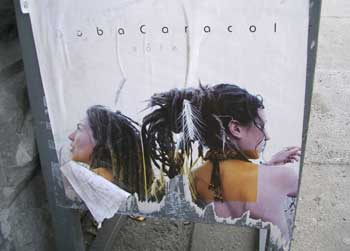
If all goes as planned, we'll have lunch with my father-in-law tomorrow noon and then head north for a week. This has been another intense week of work, culminating with a presentation this afternoon; all that went pretty well and if the boss doesn't do something unpredictable tomorrow, we might actually have a few days to regroup and relax. I wonder, especially in exhausted and frustrated moments, why I still do this - and the answer is that it's fun, on certain levels. Today we met some new people, consultants from D.C., and they were smart, interesting, engaged, very likeable, and impressed with what we showed them. It's that stuff - the chemistry, the creation of teams trying to fulfil a challenging and worthwhile goal, the figuring out how to do something new from scratch - that makes communications work fun and interesting, even when it's also maddening.
On the other hand, there are limits.
10:46 PM
|
Monday, April 25, 2005
INCIDENTS
1. Early morning; a black beetle is on its back in the shiny white free-standing bathtub. I offer it the pad of my index finger; after nervous faltering it climbs on board. I give it a ride up to the pot of grape ivy, near the skylight; it disappears over the rim.
2. The rain has stopped but the day is still blustery and cold. Walking to the post office, I notice drowned worms on the sidewalk - one of the more unfortunate signs of spring. In front of me, a larger worm, covered with grit, is trying to head across the sidewalk and into the road. I go past, turn around, pick it up and set it down in the wet grass. This action is immediately followed by a memory of how many worms I put on fishhooks as a child.
3. I notice that the river is very high.
4. Across the bank, sirens. An white ambulance with red lights flashing heads across the bridge, toward the village.
5. Three sleek crows land, cawing, in the bare sycamore saplings on the river's edge. One crow has a beakful of leaves. All around the birds hang last fall's sycamore fruits on their long stems, like Christmas balls, or dangly earrings from the 60s.
6. When I come out of the post office, the ambulance is above me on a dead-end street. I used to know the people who lived in that house. The village is silent now: no siren, no crows.
7. In front of the tenement on the corner, the green leaves of the young maple trees are curled in swollen buds, like fists.
6:56 PM
|
Saturday, April 23, 2005
GOTTA LOVE THOSE MOUNTIES
Royal Canadian Mounted Police to escort gay married couple to "40 Heroes" Celebration in Philadelphia on May 1.
Kevin Bourassa and Joe Varnell will be honored at a GLBT civil rights event in Philadelphia on Sunday, May 1. Bourassa and Varnell were the first gay couple to be legally married in North America. Two RCMP officers will accompany them to symbolize Canada's commitment to same-sex couples.
The trip will be a far cry from one Bourassa and Varnell attempted to make shortly after their marriage in 2003. The couple was turned back by US Customs and Immigration officers when they attempted to board a flight from Toronto to Georgia. US Customs and Immigration pre-check people traveling to the US at most major Canadian airports. They couple was rejected after filling out a form identifying themselves as a family.
Other recipients of the "40 Heroes" awards are Martina Navratilova, Melissa Etheridge, Barney Frank, Gene Robinson, and Ellen DeGeneres.
AND A MORE POIGNANT NOTE:
This anonymous letter at Planet Out! from a gay Catholic priest describes his reaction to the election of the new pope, and is a poignant commentary on what "keeping the faith" means for someone in his situation. I was interested, and glad, to see that he mentions Bishop Gene Robinson as someone whose witness has helped him continue under very difficult circumstances.
2:26 PM
|
Friday, April 22, 2005
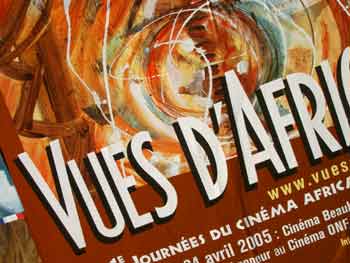
HOLDING THE LINE
“I had a very good day yesterday,” announces my father-in-law, as he settles into his chair. From the buffet, he’s brought back a plate of salad greens topped with baby carrots and ringed with six big strawberries, and another plate with a grilled hamburger from the buffet. He peers under the bun, and starts carefully spreading the hamburger with ketchup, mustard, and relish that he’s arranged in layers in one of those tiny folded paper cups that mints or condiments are served in.
“What was especially good about it?” we ask.
“Well, for one thing I was pleased with the new pope. And I wrote a few letters, which was something I haven’t been able to do at all lately.”
“You were pleased with the pope?” I’m astounded that he’d say this; a few weeks ago he made it clear he was completely disgusted with the entire thing.
“Oh yes,” he says, nonchalantly, and goes on preparing his hamburger. J. looks at him, hard, shakes his head, and goes off to get something he’s forgotten in the buffet line.
I'm somewhat at a loss. “You are kidding about the pope, aren’t you?”
“No! I think he’s an excellent choice.”
“You don’t think he’s too conservative?”
“Someone has to hold the line.”
“What? So you really think it’s good to have someone in there who, let’s see, forbids contraception?” Now I'm getting suspicious; it looks like he’s enjoying this; his eyes are half serious, half mischievous, and he knows I can’t tell exactly where he’s going to land today.
“Sure. Someone needs to be against contraception…and that other thing…” he makes vague gestures in the direction of his abdomen.
“Abortion.”
“Yes. And no…”
“No women priests.”
“Exactly.” He crunches decisively on a baby carrot.
“Come on,” I say.
“No, I mean it,” he says. “Somebody needs to counteract my liberalism, you see. I worry that there is too much liberalism like mine and unless it’s opposed…”
“People will go wild.”
He nods, and takes an appreciative bite of his hamburger. “I’ve put on weight in the last two weeks,” he says. “I need to watch it. But you should eat more. Go gets some cake.”
“I’ll get something else later,” I tell him. “Now, do you really think that?"
“Yes! Did I ever tell you – once the prep school where I was teaching sent me as a ‘delegate’ to a Catholic prep school conference, so I went, and there was a theological discussion in which everybody seemed to be taking a very liberal point of view. So I decided, for the fun of it, to take the opposite view, and I argued the strictest, most conservative Catholic position. Afterwards one of the priests came up to me and whispered, ‘That was very impressive – may I ask, what Order are you a member of?’”
"Maybe you should go to Africa," I tell him. "You might fit right in with those conservative bishops."
He looks up in mock horror. "I don't think so!"
I look at him, grinning, and shake my head. He seems very pleased by the memory. "You see," he says, "if no one takes the traditional view, there's no one for me to push against."
And I still don't know what he really thinks.
4:07 PM
|
Wednesday, April 20, 2005
GRIMALDI'S
At Idle Words, a commentary on New York-style pizza, a subject dear to my heart. J., who is at this very moment making pizza crust in the kitchen, has been a pizza aficionado since long before we met; it was clear to me at the start that loving pizza was going to be synonymous with loving him. In his post, Maciej describes several pizza places we also count among the very top - Pepe's in New Haven, is our #1 - their white pizza, a blend of garlic, clams, parmesan, and olive oil on the best crust you have ever eaten, served unpretentiously on a rectangular tray, is well worth the drive off the highway into the city, and the potential wait to get served. And Grimaldi's, at the end of the Brooklyn Bridge, also makes our top five. What about John's, in the Village? We've never, however, eaten Staten Island pizza, and it sounds like we've missed the best of the best.
Grimaldi's made it into a poem I wrote a long while back - and it's as good a time as any to post it. That was another early spring day, much like this one. The "Kim" in question is now a late-teenager, with bright red-dyed hair; she is escaping as best she can.
Two Dollars a Day
After pizza at Patsy Grimaldi’s
we walked past tulip gardens and pear trees
and then across the Brooklyn Bridge
at sunset
with the skylight still glowing
and the riches of Manhattan sparkling blue and gold and silver.
Liberty beckoned from the harbor;
the Verrazzano, a diamond necklace in the distance.
Lacework cables above us,
bicyclists rattling the wooden decking;
a big black jogger,
woman in a suit and Nikes,
other lovers.
Beneath city hall and its gilded dome
down to the trains
where a Frenchwoman read philosphy
and a black couple leaned against each other
uptown to 32nd Street and out
into the city night
small again on the fast streets full
of yellow taxis and hot smells
and people intent
on their destination.
----
“Where did you go?” said Kimmy,
who had fed the cat and brought in the papers.
“New York,” we said. “Have you ever been there?”
and she said no,
she had never been anywhere except
California once and it was wonderful,
there was so much happening! And here
nothing ever, ever happened, except they had
a new puppy, which liked to bite her.
So she took her dollars and went back home,
and later in the day
I saw her riding her bicycle up and down the street,
the way she’s always liked,
and she smiled brightly
and pedalled furiously
as if she had somewhere important to go.
4/27/97
6:49 PM
|
Tuesday, April 19, 2005
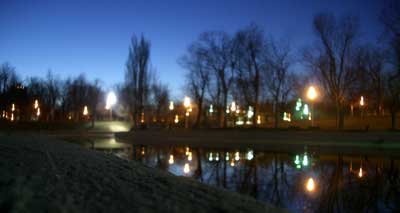
Last night was too warm and too lovely to spend inside. We walked in the park, along the serpentine lake, and then, reluctant to go in, got our bikes and rode up absolutely quiet, nearly deserted streets, past cars parked along the sides shining like dark green and black carapaces under the indefinite streetlights; the sound of a piano or a violin drifting from a window, yellow light behind lace; an occasional rustle revealing a mother coming home with a child; someone bringing in a folding chair; a cat; a woman with a cigarette gazing at the street from the shadows on a third-floor balcony.
I caught up with J. and we rode side-by-side on the dreamy street, saying nothing, reaching out once to touch hands.
Across on St. Gregoire, at the top of the Plateau -- and then coasted back home.
5:32 PM
|
Monday, April 18, 2005
A COUPLE OF LINKS
There's a wonderful story at FunnyAccent which gives a different take on running in Boston, and on the difference we can make without even knowing it.
Thanks to Language Hat, who linked to my post on language-learning, I found a new blog, amusingly named "La Coquette / Don't Hate Me Because I Live in Paris". She too is learning French, and since I had had a similar experience getting new contact lenses, I related to her story of a French eye exam.
And then there's, well, this bit of stranger-than-fiction, from the oddball humorists at the BBC.
7:59 PM
|
Sunday, April 17, 2005
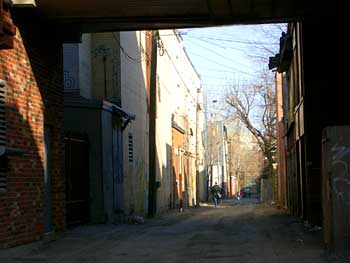
We rode our bikes through nearly-empty streets this morning for the 10:00 church service at the cathedral; it was the first time we've been able to do that this spring, and it felt great. Our usual route takes us down the Av. Berri bike path past the new and about-to-open Bibliotheque Nationale with its pale aqua louvered glass facades, and then along Maisonneuve past Place des Arts into downtown. This morning as we waited for the light near Jeanne Mance, a woman rode by wearing a retro black-and-white checked coat-dress with a tight waist, 3/4 length sleeves and flared skirt, black fishnet stockings, black flats, and oval black movie-star sunglasses; she had a bright pink milk crate on the back of her bike. She looked like she had walked out of Lauren Bacall/Humphry Bogart movie - it was a great outfit, and she had the attitude to go with it - some study had definitely gone into that one.
I just washed down the planters and bench out on the terrace; the sliding doors are open and every now and then the sound of the traffic and bicycle wheels is broken by the voices of a passing group, talking happily in French. I want to thank everyone who commented on my post about language frustrations; I'm sorry I couldn't write back personally to everybody because I really appreciated what you said. Hearing your experiences not only encouraged me but reinforced the fact that this is a universal feeling that one simply has to go through on the way to becoming more fluent and more comfortable. Most days I just enjoy the bilingualism of the city and go with the flow of it; it's easy to see that I've made a lot of progress just from noticing how much more easily I understand whatever spoken French I hear and how much more comfortable I am in various situation than I was when I first came. Along with humility, I think another lesson to be learned is patience!
This morning quietness, combined with the beautiful music and sense of peace, shared commitment, and community I've come to find at the Cathedral, have helped me rejuvenate after many days of very intense work. I could feel myself fraying on Friday and Saturday: very much in need of a break and some extra rest, if not sleep. I still feel tired but much better than I did. I like the work I'm doing a lot, and feel grateful for it - as usual, the question is balance and taking care of myself, something I've come to accept as a continual task and responsibility, not a place I'm going to arrive at and stay without readjustment.
4:03 PM
|
Saturday, April 16, 2005

MOULTING DAY
It's today: moulting day, when Montrealers shed their dull winter garb, the heavy layers, the scarves and hats and fleece and fur, and...get naked! It's the first weekend day of the warm weather, and the warmest day we've had yet. Like colorful butterflies, an entirely new flock seems to be passing by my window. They're on bikes, on roller blades, on skateboards, in baby carraiges; on running feet and slow old feet, on barely-able-to-walk-yet feet, and on four paws. It's fabulous, as if everyone has suddenly been set free, and they're celelebrating in motion, in color, in cafe-windows flung open, in an exuberance of winter-pale skin bared to the sunlight.
We're going to friends' tonight for the first barbeque of the season, and I offered to bring strawberry shortcake; the shortcake is baking in the oven right now, awaiting the basket of strawberries we brought home yesterday from the Jean Talon market. It's the first cake I've baked here; with boulangeries such as there are in this city, I'm afraid my Vermont country baking has seemed, well, superfluous. But the scent of butter, sugar, vanilla, ginger, and browned almonds is lovely in the house today; I'm going to play my flute a little, with the door open to the outside, where, above the happy people and happy dogs and children in their carriages, a light blue sky is crossed with a delicate tracing of tree branches, each dotted with swelling buds of almost-leaves.
5:36 PM
|
Thursday, April 14, 2005

OF LOCKS AND KEYS
The other day I went to the local locksmith because we needed two keys copied. One was straightforward, and I was sure it wouldn’t be a problem, but the other was for a bicycle lock. The locksmith shop is on Papineau; I’ve been there several times and so I know that the proprietor doesn’t speak anything but French. On the way, I figured out how to ask for what I needed. Once inside the shop, we greeted each other, and I handed him the first key and asked for two copies. He nodded and asked if that was all. I said no, and handed him the other key, asking if he could make a copy of it. Suddenly, there was a torrent of French – an explanation, I assumed, of why he couldn’t copy the key – but I could hardly understand any of it. From his inflection, I realized he had ended with a question – which of course I couldn’t answer, so I stood there, staring at him dumbly, helplessly. He repeated the question – it seemed he was confirming whether or not it was a bicycle key. I said yes, it was a bicycle key. More incomprehensible French. I shook my head and said thank you. He handed me back the key, looked at me with a certain disdain, and set about making the first copy while I dropped the bicycle key into my purse feeling, well, vulnerable and not very happy. I didn’t blame him – he’s a nice enough man – after I paid him he started waiting on a French woman who had just come in, and he was smiling and making polite chatter. If I had been able to banter with him, he would have been just as pleasant to me.
So then I walked down Marie-Anne several long blocks to the bike shop where we bought our bikes last summer. The shop was bustling and packed to the handlebars with bikes and accessories. The young clerk I remembered from last year was there, waiting on someone at the counter, so I stood in line until he was free. He doesn’t speak anything but French either, but he’s a different sort of guy. I asked my question, told him I had lost one of the bicycle keys, was it possible to obtain a replacement? So far so good. “C’est perdu?” he confirmed. “Oui.” He looked at a loss, and asked if I had gone to a locksmith. I said I had, but now, two or three sentences deep into the subject, I was running out of explanatory words. He motioned to me to wait, and gestured toward the other clerk, who I gathered spoke English. He was busy, and a young Asian woman - another customer – who spoke flawless French and English kindly offered some suggestions about who might be able to replace the key for me. I thanked her and the clerk and then asked about a pannier, a basket for the back of my bike, trying to go back to French, and we concluded our discussion in the usual two-language back-and-forth I’ve come to expect in most places here.
But somehow, this experience, on that particular day, threw me. I left and started walking home, feeling like I might cry. “It doesn’t matter how long I live here or how hard I try,” I said to myself, miserably, “I’ll never master this language completely, and I will never, ever fit in. What are we doing, choosing to live in the Plateau where anglophones are already resented?” Luckily I saw that I was passing a favorite bakery, so I went in and bought a couple of cookies – a transaction for which I didn’t need any specialized language. But even chocolate didn’t lift my spirits quite enough, and the helpless, isolated feeling haunted me the rest of the day.
Yesterday, though, I found myself taking care of my former landlady’s little girl, as a favor while the mother did an emergency errand. Left alone with the daughter, and a menagerie of stuffed animals and plastic dinosaurs, I was able to think back to last May when we first lived here and I would try to play with M. and barely understand a single word she said, while she’d look at me like some strange dumb animal, screwing up her little face in puzzlement and frustration and demanding, “Quoi???” She’d never had to deal with non-French speakers in her short, highly animated and very verbal life. But there I was yesterday, able to talk to her, able to understand much of what she said, even able to concoct some games and comfort her when she decided her mother was never coming back.
“So, that’s it, I’m at a three-year-old level,” I thought, wryly, feeling a bit more able to laugh at myself. “Everyone who finds themselves in a foreign country must feel this, and yet they learn the language, they manage.” I told myself, “Come on, you’re doing your best, look at all you’ve learned.” Gradually I did feel better, and I was grateful to my little friend for giving me a yardstick for measuring some progress. Still, there is something about feeling cut off verbally that is deeply disturbing to me, and it obviously goes to the core of who I am.
As I thought about it more, I decided that it wasn’t so much an inability to make myself understood – for I’m pretty good at that, using language or not – as it was not being able to understand others, and how humiliated I feel when they instantly switch to English, or turn their backs – whether the gesture is real or only felt. The switching, I’ve found, is often Canadian politeness, and most people will continue in French if you tell them you’re trying to learn and improve. I recognized that discomfiture was also coming from a bruised ego. I am not only a word person, and someone who wants to communicate and know other people, but I’m an over-achiever, and I can’t stand feeling stupid or unaccomplished, especially in this sphere. That’s a hard thing to admit, and a deeper one to face squarely, but I’m sure it’s yet another lesson in humility that’s important for me to experience -- or it wouldn’t be happening in such a total and unavoidable way, with my own willing, if sometimes uncomfortable, participation.
9:03 PM
|
Tuesday, April 12, 2005
NEWS BITS
A couple of items from today's Montreal Gazette:
Let's not Arm Border Guards
"Providing Canada’s border guards with sidearms would be a “dangerous move” and contribute little to improving national security, according to RCMP (Royal Canadian Mounted Police)Commissioner Giuliano Zaccardelli. “I know being at the border can be risky and there are certain dangers,” he said yesterday. “But somebody who runs through the border and having a customs officer run out of his hut and shoot after them – I’m not sure we want to do that.” He said he’s against arming people “simply to create the notion that we are going to feel more secure.” Zaccardelli made the comments before a parliamentary committee reviewing Canada’s anti-terrorism legislation yesterday. "
Community Bands Together to Rehabilitate Youthful Mugger
Along with many others, we've been following the story of an 18-year-old young man who robbed a 90-year-old woman and shoved her down some stairs in the metro a while back. Apparently the young man, the son of a mentally-ill anglophone mother and Armenian father, had suffered such neglect and difficulties in his childhood that once his story came out, both this local community and the victim have pled for leniency and rehabilitation rather than punishment. The boy's mother committed suicide in 2003 after years of refusing to talk to her son. In January, his father "dropped him in Montreal with $100 in his pocket in order for him “to become a man,” one witness said. At the time of the mugging, he had been living with friends for a few weeks.
One thing we've noticed in reporting about the rare violent crimes that do occur here, is that the papers and community and justice system always seem to ask and report how the victims feel about the crime and the sentence. To us this seems old-fashioned, quaint, idealistic...and amazing, if it actually works. And it seems like although religion may not be expressed in the way it used to be, through church attendance, devotion, and loyalty to priestly authority, the values of forgiveness and reconciliation are still at work in this society. Read a couple of quotes from this article, entitled "Métro mugger needs love – not prison, supporters say."
Emrys Brooks Djierdjian made a terrible mistake when he robbed a 90-year-old woman and shoved her down some stairs, but he is a teen in need of love and support, not prison time, say friends and neighbours from his small village who have stepped forward to take him under their collective wing...
[people]... from the village of 2,000, 60 kilometres north of Montreal, said they decided as a group that instead of sitting back and watching bad news on television or reading about it in the paper, they would take some responsibility as members of society. They’ve raised money to pay for any therapy Brooks Djierdjian needs. One has offered him a job. Even the victim, Gemma Martel, who suffered a fractured pelvis, broken arm and bleeding in the brain, has written a letter of forgiveness to her aggressor, said supporter Catherine Ruiz-Gomar. “If this society believes in rehabilitation, then we need to give people the means to do it,” Lamarre [a neighbor] said.
The judge is scheduled to make a decision in the case tomorrow.
7:39 PM
|
At the border, the douaniere asks us for our license plate number: “I’m afraid I can’t read it,” she says, smiling. We laugh and tell her the number, and she cheerfully waves us through. She’s right; the car is covered with road spray and salt – an indication both of this place and season, and a life that’s lately had few chinks in it for such things as washing one’s car.
It’s a beautiful day - cold, sunny and clear - and the wind buffets the small car from side to side as we cross into the flat plain where flocks of geese stand in the corn-stubble of the endless fields where clods of black earth plowed last fall lie thawing in the sunlight. Silvery pools shine in the curving furrows where the plow approached the road and made its wide turn back toward the east, and the long drainage trenches, stretching to the horizon as straight as a column of mercury, send a sudden reflective flash as we pass by.
I wondered, at first, if I’d become bored over time with this drive through so much apparent sameness; I grew up, after all, in a very different agricultural landscape that has always seemed to me the epitome of pastoral beauty with its varied fields of hay and corn and oats, its hedgerows and orchards; woods on the higher ground and blackbird-busy swamps in the lowlands; herds of black-and-white dairy cows in the pastures and sheep, goats, geese and chickens in mud-luscious farmyards. What was the appeal of acres upon flat acres of nothing but corn, on a land scoured flat by water and glacier and swept by a constant wind whose only positive purpose seemed to be keeping aloft the white fleur-de-lis on the blue fields of the Quebec flags fluttering in so many farmyards?
Perhaps it was that blue that gave me the clue yesterday, as I looked again at this land that, I realize, has stolen its way into my heart: it may look vast and all the same, but it’s a sameness like the ocean, a sameness that changes its face with the day and the season. One has to look harder, perhaps, to perceive it, but within the wheel of the seasons rolling over these raw and elemental fields, a smaller wheel turns by the day: the differences in the play of light depending on the clouds and the sun or lack thereof; the angle of the wind and its strength; the presence of birds and their tendency, depending on their own cycles, to lift off the ground in wide flocks or scatter individually; to stand, satiated, and observe, or to be on the move, as the geese were yesterday, flying in low purposeful lines above the waiting fields dotted, in the far distances, by a steeple, a cluster of houses, and the silos where the golden products of so much flatness are stored, for a time, in the sky.
9:39 AM
|
Sunday, April 10, 2005

A long weekend of mostly work, and I'm not done yet. This morning I was the organizer and one of the presenters for a talk on the Windsor Report and the future of the Anglican Communion, and it took most of yesterday afternoon to prepare for that. Yesterday morning and this afternoon I've been preparing for a business meeting tomorrow. After that, in the afternoon, we're heading north, which I'm looking forward to very much indeed.
We've had a string of fabulous, unseasonably warm days in New England, and there was time to get outside and uncover the vegetable garden and most of the perennials, rake leaves, get a permit to burn some brush, and do a lot of our usual spring clean-up. And, oh, it felt glorious to be out there with the sun on my back and the smell of the earth coming up from the mud and the wakening grass! There's a patch of snowdrops from my late grandparents' garden in bloom, and another of delicate pale blue crocuses; during the past few days nearly all the snow and ice disappeared from its final banks on the north side of the house, leaving undulating frost heaves and squishy earth. How good it is to feel my hands in the soil again, pulling dry leaves from the base of the lavender and the peonies, discovering the pale red shoots of tulips, running my fingers over the soft green "fur" of the lambs' ears. And when the sun has set and I open the back door, it's a robin who scolds me from the apple tree, reclaiming her world.
8:32 PM
|
Friday, April 08, 2005
NOTE TO READERS
Like many Blogger users, apparently, I've been having trouble accessing my account and posting. This shouldn't affect readers who try to view the blog, but if it looks like I'm not posting regularly, that's the reason. I've taken steps to do what I can to fix the problem from this end in the short term (clearing cookies, basically); in the longer term it's likely that I'll be moving this site to our own server and different blog software. Stay tuned. And apologies for the interruptions and inconvenience.
3:22 PM
|
Yesterday I told my father-in-law about the book-weeding. He looked nervously at his own shelves. “There are books here I couldn’t imagine parting with,” he said, and then grinned. “But obviously I can’t take them with me! Where are you taking them, is someone buying them?”
No, I tell him, we’re donating them to a charity sale.
“That’s the thing,” he says. “No one will give you anything for used books. David” (his other son) “tells me that after I am gone…dead, that is…probably my library will be given to a small college, where they’d be glad to have them.”
“That’s a good idea.”He looks around again, and back at us. “But there are some I wish would stay in the family. David took one whole shelf.”
I don’t know whether to tell him there are books here I’d love to have, or whether it’s not the time, or my place to say that. I figure there will be other chances. And if he starts telling me to take books, I’ll probably get tearful and embarrass and upset him, so I stay silent. Instead I tell him about the book meme.“There’s been a thing going around the internet, asking people if they were going to be marooned on a desert island, what five books they’d take with them. What do you think? What would you choose?”He looks at me skeptically – he dislikes all games and quizzes, but I can tell he is either somewhat intrigued, or willing to humor me. He thinks for a minute, and doesn't say anything.
“The Qu’ran,” J. suggests.
“No, it’s a very disappointing book,” he says. I raise my eyebrows in surprise.
“No, it really is,” he insists. “It has no narrative. It’s a collection of Mohammad’s sayings, his revelations, over five periods of his life – he’d say something, and someone wrote it down on a palm leaf, and after he died, they collected all the palm leaves…”
“or backs of envelopes, or paper napkins…” said J.
“Exactly. They collected them all and wrote them down. It’s a book of utterances.” He frowns, and then gets a beatific look on his face. "But the recitations, the chanting of the Qu’ran! That is something else entirely. I was listening the other day to Iraqi radio, and there was someone chanting the Qu’ran with such a pure voice, so beautifully! Oh, it’s something when they can do that!”
His eyes are closed; my husband and we exchange the look that means “this man will never cease to amaze me.” “OK,” I say., when he opens his eyes. “Come on. Pick five books.” He looks at the shelves, looks back at me.
“What did you pick?” he asks, finally.
“The Iliad.” He nods in approval.
“Complete Works of Shakespeare.”
“That’s not a book, that’s a library!” he says.
“Well, yes, but we need volume. Collected Poems of Czeslaw Milosz – he’s a Polish poet.”
“Never heard of him.”
“The Oxford Book of American Verse.”
“Hmm, that’s interesting, I don’t know it either.”
"And maybe a Bible?”
“BAH!” he exclaims. “Another disappointing book.”
This man just loves to be perverse, I think to myself.
“I also thought maybe I’d just take five blank books,” I tell him.
“Not a bad idea,” he says, and then goes back to the Bible. “It’s too long, and very repetitious. I prefer the Reader’s Digest Bible.”
“WHAT?”we both say simultaneously. “What is that?”
“I have it right in my study, go look. They’ve done a marvelous job, they’ve cut out all the repetition, and added a lot of excellent pictures.”
J. goes and brings back a thick dark blue book, and begins thumbing through it. He’s right, the illustrations are pretty good. I find the concept a little weird, but, hey, that’s what Reader’s Digest is famous for – condensing books. This is also one of those cultural things: I grew up thinking that the Reader's Digest was beyond the pale, but my father-in-law always thought it was a very legitimate, important, and impressive publisher, largely because he missed the cultural clues, and because he knew someone who was an editor there, and this man showed an interest in his work.
Meanwhile, J. is looking through a central section called “great paintings of Biblical scenes.” He holds up a Victorian painting of a bloated fish-like whale, out of whose mouth the figure of Jonah is being ejected. We all look at it, speechless for a few moments.
“The printing is really excellent, don’t you think?” my father-in-law says.
In his study there must be twenty Bibles, including all the best-known English translations as well as Bibles in various other languages. He’s such a BS-er, hauling out this one today.
‘Well,” I say, trying to lubricate the conversation, “I suppose if it gets more people to read books…”
“I knew a woman who was a condenser for the Reader’s Digest – that’s what she did. Very brilliant woman. She had a method; she’d hold a pen in her hand and mark as she read, cutting all the superfluous parts. She was very good at it.”
‘Very brilliant,” says J. under his breath.
‘I don’t suppose Tolstoy would have thought too highly of it,” I remark.
He shrugs, and grins devilishly: “I know one thing - you won’t get any money for any Reader’s Digest Condensed Books at any booksale.” Then he settles back in his chair contentedly. “And as for the desert island - I think I prefer the five blank books.”
1:16 PM
|
Wednesday, April 06, 2005
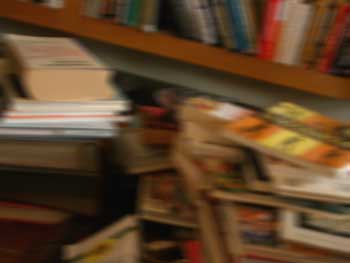
GOODBYE BOOKS
One of our agreed tasks this week has been to do what we've been talking about for a long while - go through the books and actually get rid of those that no longer mean anything to us. Note that I didn't say "those we'll never read again" - because there are books on our shelves that I doubt either of us will re-read but we wouldn't part with for anything. No, this is a purge of dead weight, of books that are pointless taking up shelf space in this particular house. Some would see this is a wrenching, even devastating process -- when one of my friends moved into a retirement home it was the dismantling of his library that affected him the most: "like having my limbs amputated," he said. I'd probably say that too, if I had to give up my shelf of Russian literature, or choose between keeping poetry books or art books. Maybe someday it will come to that - I hope not - but the books on the floor are more of the how-to variety - I don't need my cold-climate gardening book anymore, and cookbooks I haven't used in two decades are not likely to enhance our cuisine around here anytime soon. What surprised both of us is that, once we also take away computer software documentation and old magazines, the volume is reduced by 1/3 to 1/2: leaving the literature and essays, religion and history, sociology and cultural studies, poetry, art and photography books that really do matter to us, as well as some sentimental volumes that remind us of the original owner or the giver.
All of this book-weeding brings me back to the desert-island book meme, and all the lists I've read on various blogs. (We may complain, but wasn't it pretty interesting to see what everyone chose?) If I had it to do over, this week, I wonder if I might simply take five of the fattest blank books I could find. On a desert island, or in solitary confinement, would it be worse not to be able to read, or not to be able to write?
9:52 AM
|
Tuesday, April 05, 2005
MORE ON THE POPE
Lorianne at Hoarded Ordinaries has written a thoughtful, personal, and ususual reflection on the death and life of the Pope.
2:18 PM
|
Monday, April 04, 2005
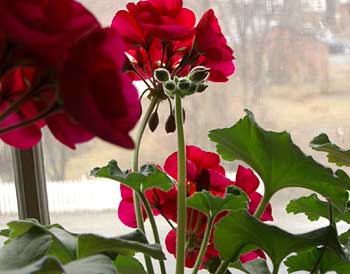
The geraniums think it's spring...
PURPLE CROSS
This is a scene we're missing, not being in Montreal during the time of the Pope's death and funeral. And we're sorry, because it would be interesting, and no doubt moving, to see the reaction and observance of his life and passing in this very Catholic city. According to articles in the Montreal papers, Mary Queen of the World Cathedral was packed with mourners. That's unusual: the huge Catholic churches in every neighborhood, including ours, are virtually empty on Sundays - cavernous, ornate monuments to the past grip that the Catholic Church used to have over nearly every French-Canadian living in Quebec. La Presse recently ran a series of articles on religion, noting that among Catholics and Protestants religious practice and attendance continues to be in a steep decline - it's a very noticeable difference to us, as Americans - but belief and acceptance of institutional authority are two different things. the Pope's death brought the people out, and their sincere grief was expressed openly in what they said he had meant to them. John Paul II had visited Canada, and this was also well remembered. It's a tradition that the lights on the cross on the top of Mont Royal, overlooking the city are turned purple in the event of the death of the Pope -- and purple they apparently are right now, glowing rather eerily through the fog.
My Muslim friend Shirin came over last night and asked if she should offer her condolences. I thanked her and smiled, saying "He's not my Pope." I've never been a fan of the papacy, seeing it as a symbol of the institutional church writ large; of politics, wealth and intrigue; a bastion of traditionalism and conservative values; an obstacle to modernity that had a particularly deleterious effect on the lives of women. Thinking about it recently, I realize that my positive feelings had mostly to do with the art that the Vatican owns, although I haven't seen much of it, never having been to Rome - a show of da Vinci drawings, and my memorable look at Michaelangelo's Pieta in the Vatican Pavilion at the New York World's Fair. I had hopes for the Catholic Church after Vatican II, hopes that were dashed by the conservative clamp-down that came afterward.
Yesterday, though, I read the long special section on John Paul II in the Montreal Gazette, including an excellent biographical article picked up from the Los Angeles Times, and looked at a photo gallery of the Pope's long life - and I found that my attitude softened. John Paul was more complex than I had realized. His conservatism on personal matters, and his opposition to the ordination of women and to liberation theology in South America were certainly as strict and uncompromising as I had always thought. But he had also been a consistent voice for peace and for interfaith respect and dialogue, two issues that are closest to my heart. He added a strong voice to the liberation of his Polish homeland and undoubtedly helped the fall of communism. He apologized for the church's role in anti-Semitism, while being steadfast in his support for the rights of the Palestinian people to have their own homeland and to live in peace. He continually opposed war, genocide, torture, and capital punishment. And in the photographs one saw a man willing to meet people of every religion and every race, willing to use his own body and the power, such as it is, of his office, to show respect and to encourage dialogue and peaceful communication rather than violence.
I looked at photographs of the Pope with Castro and with Reagan, with Hindu leaders and Muslims, with Anglican and Orthodox Christian leaders, with whom he tried to heal very very old rifts. And since the photographs were chronological, I watched him get older and more frail, but the accompanying stories showed his intense determination and awareness of the symbol he was to so many people - so he finished speeches even when he was very ill, he walked when it was difficult for him, he kept traveling almost to the end. I couldn't help but admire that.
My feelings about the institutional church and the Papacy are colored by my enormous resistance to clerical authority, and my abhorence of masses of people accepting anyone's word for what they should think and do, especially in the most personal areas of their lives. Knowing the extent of human frailty and self-deception, I cannot accept that any human being, by virtue of their high priestly office, is God's anointed representative, empowered with special knowledge or the ability to pardon sins. I am more than ready to humbly listen to and learn from the immense knowledge and experience of certain religious people - both ordained and non-ordained. But I cannot, and never have, accepted someone's authority to interpret scripture or tell me what to do or think simply because they were "my priest" or "my bishop". Religious fundamentalism and conservatism, in all faiths and in cults as well, have shown us where that road can lead. But even in my church, there are many well-educated people who will not question the authority of the priest, don't trust their own ability to read and grapple with scripture or church history, or who can't seem to take on their own ministries, in or out of the church, without the priest's "approval". I sometimes think that one reason I have so many close friends among the clergy is precisely because I don't think that way. But my clerical friends, not surprisingly, tend to be of the progressive ilk, and are going about their ministries with eyes wide open to a changing world and an awareness that the Church, too, must change to meet it. They also tend to be people who realize that true authority is earned, not conferred along with a degree or a title.
Two photographs of the Pope have stayed in my mind especially. One is a black-and-white shot of the white-robed Pope, small and seen from the back, talking in a high-ceilinged jail cell to the man who tried to assassinate him. The other is of him as a very old man, in the same familiar white robes and skullcap, sitting at a small desk set on a large grassy lawn surrounded by trees, somewhere in Italy. He's bent over, he's all alone except for a few books, and he looks up as if to say, yes, I'm still here, I can't get up, take the picture. It's a bizarre photograph, of what must be one of the strangest jobs in the world.
5:04 PM
|
Saturday, April 02, 2005
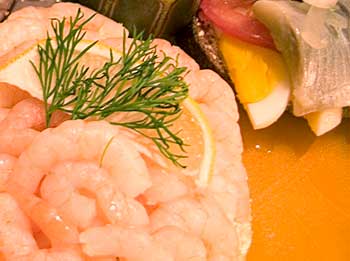
SMRREBRD
The other night, our wonderful Icelandic neighbors, happy to see the lights on again in our house, invited us for dinner. H. had just returned from Iceland, laden with foodstuffs. On the phone he told us he was cooking fish, but when we arrived he said, no, it was going to be smrrebrd.
“Sit!” he commanded, filling small glasses with ice-cold akvavit and larger ones with our choice of beer or white wine. And out of the kitchen, with a flourish, came two platters of the most beautiful composed sandwiches I have ever seen, of a special, dense, Danish rye bread spread with butter, and then topped with veritable sculptures of appropriately combined shrimp, hard-boiled eggs, an Icelandic liver pate topped with slices of port-wine aspic, marinated herring, salami, onions, and Icelandic caviar, garnished with sprigs of fresh dill. I especially love herring, and the caraway-flavored aquavit was the perfect accompaniment. It was, in a word, a feast.
Smrrebrd is the Icelandic word for smorgasbord. Looking up “smorgasbord” to make sure I was spelling it correctly, the dictionary confirmed H. and E.’s explanation that the word means bread (brd) and butter (smrre). The word smorgasbord is Swedish; the origin of its first half is the Old Norse word smör or smjör , meaning fat or butter. (It’s no leap to realize that’s the source of our English word “smear”.) But it’s interesting that smorgasbord -- originally a selection of these beautifully composed sandwiches -- has come to mean a buffet, with a large selection of unrelated dishes –anything from cold lobster to baked beans. More generically, we've come to use the word to mean a mixture or even a “hodgepodge” -- which is not at all a description of the culinary artworks we ate that night.
4:47 PM
|
Friday, April 01, 2005
BUSY, BUSY
As I guess is fairly obvious, I've been pretty occupied this week without much time for writing (well, I've been writing, as part of a big project I'm in charge of, but that's rather different.) I feel like I've hardly looked around myself since coming back down here, although for the first time since winter began I was able to take a walk around my garden and check on the plants - always a happy occasion. I found two roses that I'm worried about (standard for northern New England - you just take your chances with roses unless you are willing to bury them each fall, even the rugosas sometimes succumb), and the crack in the trunk of the weeping Siberian peaberry seems larger, but other than that everybody looks like they made it through the winter - reddish-brown tulip shoots are up, the Oriental poppies are growing little soft tufts of leaves, and the daylilies are poking green leaf-tips through the thawing snow and mud. It's too early to rake the leaves off the perennial beds - we had sleet last night - but it won't be long now. On the drive down here we saw many flocks of migrating geese, including one group of snow geese over a Canadian cornfield. Now I can hear redwing blackbirds calling in the trees outside, and the robins are bouncing around in back of the house, looking for worms. Q.E.D.
One of my top priorities, besides the ruthless purge of our bookshelves we've vowed to do this spring and the replacement of the curling linoleum floor tiles in our bathroom, is to move my blog and finally get off Blogger. I'm really distressed about the slow loading times and the ridiculous problems accessing the Blogger site and then losing posts during publication (which of course wouldn't be so bad if I remembered to copy them first, or write them in a word processor). I've started a non-public shadow-blog on Typepad to see how I like it, but I'd be grateful for your suggestions about various weblog software and hosting services. I'd especially like to hear from Typepad users about your experiences with managing comment spam, which (knock on the old maple chair) has not been a problem for me so far.
5:08 PM
|
Wednesday, March 30, 2005
EASTER BREAD FOLLOW-UP
Here is a Portugese recipe that sounds like the same thing as the basket-shaped, egg-bearing breads I photographed at Easter. In this case, uncooked eggs are pressed int the dough and baked just like that, along with the bread. I also looked through some Greek recipes for traditional Easter bread, and those use red-dyed, hardboiled eggs that are also placed on top of the dough prior to baking.
I'm dubious but I guess I'll just have to try it, and hope I don't end up with exploded egg all over my oven! Not one of these recipes talked about piercing the eggshell first.
5:21 PM
|
BOOK MEME
A week or more ago, my friend Marja-Leena asked me to contribute to this meme, and I got all consumed with work and travel and forgot to even write back. So here is my apology (sorry, M-L, and thank you for asking me!) and an attempt at a response:
You're stuck inside Fahrenheit 451, which book do you want to be?
Sorry, I've never read it.
Have you ever had a crush on a fictional character?
Yes. Laurie in Little Women/Little Men. Rennie in the Jalna series (we’re really getting back there in time now.) Dr. Zhivago (which had more to do with Omar Sharif than the actual book, I’m afraid).
The last book you bought is?
Le Premier Siecle après Beatrice, by Amin Maalouf
What are you currently reading?
The Maalouf. Confessions of an Igloo Dweller by John Houston. Two Solitudes by Hugh MacLennan.
Five books you would take to a deserted island:
1. The Iliad
2. Collected Poems, Czeslaw Milosz
3. Oxford Book of American Verse
4. Collected Works of William Shakespeare (we’re going for length and re-readability here)
5. A Bible (maybe) or The Book of Common Prayer (although I probably have much of the latter memorized – I’d take it as a hedge against going completely insane). Or maybe Bach's Well-Tempered Clavier or a book of Beethoven sonatas, for playing air piano. (This is a rough choice.)
Who are you going to pass this stick to (3 persons) and why?
Maria, poet and writer, of eclectic tastes, who will make wonderful choices
qB, because I'm guessing she’ll choose some quirky things far less boring than my "classics"
Language Hat, who reads more than any of us but rarely reveals anything very personal. I'm not sure if he'll respond but I'm hoping he will.
3:43 PM
|
Sunday, March 27, 2005
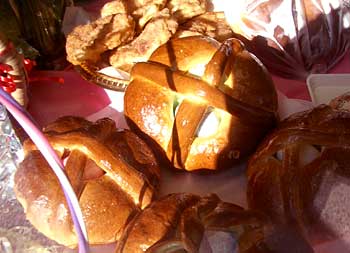
HAPPY EASTER
Happy Easter, happy spring to everyone. These beautiful breads were in the window of a Portugese bakery on St. Laurent - they represent the cross, obviously, but the cross with resurrection in the form of colored eggs that are baked, whole in their shells, into the basket-form of the bread. Sorry the photo isn't better - there were too many reflections in the the window.
We're off to church; after digging through my closet I finally found a pink sweater to wear instead of my winter wardrobe of mostly black and grey wooly things. More later. But I hope the sun shines on you today.
9:11 AM
|
Friday, March 25, 2005
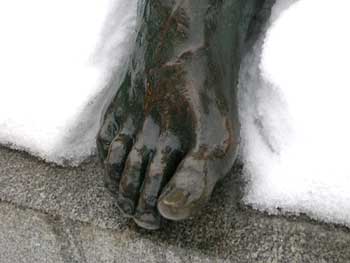
GOOD FRIDAY
This is the first Good Friday in a decade that I've neither attended church nor sung in a choir. It feels strange not to spend Holy Week as an active liturgical participant in the progression of services that retrace the steps of the Passion narrative. It also feels – I must admit – liberating to do something different, and to be able to step outside of patterns and expectations, and observe how I feel.
I’ve sometimes tried to fast on Good Friday, and even when I was a college student and feeling perhaps the furthest away from religion and the church, I still observed the day in some way, consuming less, working less, spending time in reflection on the story and what it had to say to me, thinking about human beings and their tendency toward violence and the silencing of those who upset the status quo. The day has often been a time of thinking about my own “big issues”, which I’ve tried to identify during Lent, before letting them go after the season is over. It’s interesting that I find myself casting back now to Good Fridays during those college years, when war, governmental excess, and an uncertain world were so much on my mind: probably I surprised myself then by observing the day, so much so that I’ve always remembered it. We don’t really change that much, in our core.
But today I haven’t been especially reflective, and certainly not sad. In fact, it was another beautiful early spring day here, and I spent the morning working by e-mail and telephone with a colleague, finishing the first part of a big two-part project, and then, in the afternoon, went for a long walk, stopping in at some of the Portuguese bakeries I’ve never visited to see what traditional things they had prepared for Easter. I stopped in the North African “souk” on Duluth and bought a tile to try in our Vermont kitchen, where we’ve decided to finally finish the décor, and I bought a small solid brass camel for my father-in-law: something I had seen months ago and have thought about as a gift for him ever since. I was, in a word, happy.
Later I did a search for Good Friday poetry, and came up with the following poem by John Donne. I got fascinated in the excellent commentary by Ian Lancashire on the website of the University of Toronto English Library – a resource I’m looking forward to exploring.
These are lines 29-42 of a 42-line poem, written by Donne, who was a Church of England preacher, in April 1613. (I’ve put the lines into modern English.) The whole poem is very rich, both in its language and its content, which says a lot about English thought at the time – it contains a continual play on the word Sunne, for both “Son” and “Sun”, talks about astrological ideas like the harmony of the spheres, and uses the metaphor of Donne’s journey westward, toward the setting sun, as a way of talking about moving toward death – and the soul’s relationship to God as that approaches. The west, from London, also meant Tyndale – the place here criminals were hanged – and it implied going west to America, a symbol for seeking wealth.
In the England of his day, everyone was expected to spend Good Friday in reflection and fasting. Donne, who had been a lawyer, a member of Parliament, and was jailed for marrying against his father-in-law's wishes, was ordained in 1615. On this Good Friday, though, he was not in church but on the road, riding west; the poem is about his somewhat reluctant guilt for being where he was, and unreadiness to face his creator. So, like me, he spent an unconventional Good Friday in unconventional observance, and today the years between us collapsed.
I learned another thing about Donne today: other than two poems which were published, his poetry circulated only in manuscript during his lifetime.
Good Friday 1613, Riding Westward (last section)
John Donne
If on these things I dare not look, dare I
Upon his miserable mother cast mine eye,
Who was God’s partner here, and furnished thus
Half of that Sacrifice, which ransomed us?
Though these things, as I ride, be [far] from mine eye,
They're present yet unto my memory,
For that looks towards them; and thou looks towards me,
O Saviour, as thou hangs upon the tree;
I turn my back to thee, but to receive
Corrections, till thy mercies bid thee leave.
O think me worth thine anger, punish me,
Burn off my rusts, and my deformity,
Restore thine Image, so much, by thy grace,
That thou may know me, and
I'll turn my face.
8:44 PM
|
Thursday, March 24, 2005
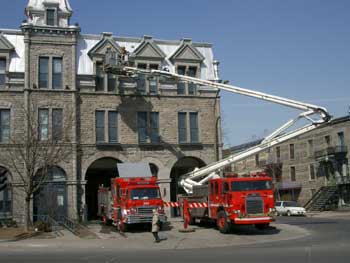
Les pompiers do some spring cleaning
You know you're not living in a completely secular city when you download the bus schedules and find there is a special schedule (of greatly reduced numbers of buses) for Good Friday, and that everything in the city is closed on Easter Monday.
I've also never seen so much chocolate in my life, or so many variations on the theme of Easter basket: chocolate rabbits, trucks, footballs...I even saw chocolate beavers. And huge! Nearly lifesize! For the upscale shopper, the fancy boulangeries have cellophane-wrapped, ribbon-tied special rabbits and eggs in white and dark chocolate, or egg-shaped, foil-wrapped baskets that seem to be filled with fancy candies. I've seen little of the tacky Wal-Mart variety of purple shredded fake grass with plastic-wrapped standard candy and plastic and stuffed toys, although I'm sure those exist here too.
It's not making me particularly hungry, although maybe before the weekend is over I'll succumb.
Meanwhile, the snow is melting in the park, and the seagulls are starting to screech and fight as they pick through leftovers, emerging from a winter under the snow. The city doesn't look beautiful right now, but I don't care - to me it is glorious to feel the sun and ride a bus past people gliding joyously on roller blades; to pass the neighborhood cafe and smile at the proprietor, out sweeping the sidewalk for the first time in months, getting ready for the first day he can set tables on the sidewalk; to see bright pink and yellow and red tulips in galvanized buckets outside the florist's window. I left my bus at Champs-des-Mars and walked from the Old City toward downtown, keeping on the sunny side of the street where water ran down the sides of the old stone buildings and sparrows sang on the doorsills. In front of Notre Dame basilica, the horse-drawn carriages waited for tourists, while the horses in their flower-decorated harnesses patiently gazed down the street and the drivers talked animatedly with one another in their Quebecois accents. The sky was brilliantly blue, and the light shone on the ships in the port and the water beyond. Everyone was out, bareheaded, coats flapping open, and even in the business district where the usual casual Montreal dress gives way to dark suits and ties, there was an animated excitement at noon as people tumbled out of their glass-and steel buildings and winter underground existence, into spring.
8:17 PM
|
Wednesday, March 23, 2005
Sa’di, a great poet of Persia (c. 1213-1293, Shiraz) wrote:
"Every leaf of the tree becomes a page of the Book when once the heart is opened and it has learnt to read."
8:43 PM
|
Tuesday, March 22, 2005
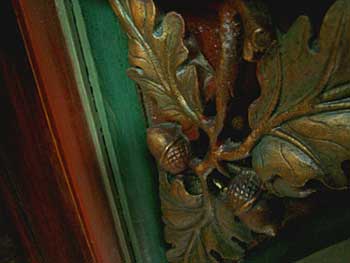
THANK YOU...
to everyone who wrote with blogday wishes yesterday. I appreciate your ongoing presence and your kind words more than I can possibly say.
8:59 PM
|
TECHNOLOGY
The family got together and gave my father-in-law a computer after he retired from teaching and full-time ministry. He hoped to devote himself to writing. That was perhaps twenty years ago, and despite being a disaster when it came to anything mechnical, he learned to use the computer for word processing by memorizing rote pathways for saving files and doing basic formatting – when he got stuck or lost things, he’d call and someone would bail him out. The computer, or “my machine”, as he called it, was a Big Mystery; he had no desire to know how it worked, he just wanted to do what he needed to do: write, save, edit, and print – and for the most part, it helped him do those things pretty reliably.
When the internet arrived, he was curious but even more mystified. His computer didn’t have internet capability, so my husband showed him on ours what you could do. He was baffled, but mainly because he couldn’t comprehend either the economics or the altruism. It wasn’t compelling enough for him to justify the cost of a new machine. When he moved to the retirement home, there was internet access for residents in the library, and for a while he had a password and an e-mail account. For the first time he had to learn to use a mouse, and navigate a graphical interface; he was always getting mixed up or losing his place on the screen, which scrolled unpredictably or zoomed in or out when he clicked in the wrong place, but he stuck with it for quite a while, always amazed to find mail. That ended about a year ago when he simply stopped checking his mail. He never learned how to do research on the web: he didn’t have to. There were always obliging young female librarians at the public library who were happy to fulfill his requests, and lately, now that he doesn’t go out, his neighbor across the hallway is glad to do the searching.
“I ask him for something, and he comes back in half an hour with the whole thing printed out on a sheet of paper. Incredible!” he says. “But what I want to know is, who pays for it?”
“What do you mean, Dad?” J. asks.
“Do you have to pay to use it?”
“Yes, you usually pay a yearly fee.”
“Oh.” He thinks for a minute. “But how does the material get there? For example, someone wrote a book about the school I used to teach in, and it mentions me, and it’s all there on the internet. Did he have to pay to put it there?”
“Well, sort of. When you set up a website you pay something, but it’s not that much.”
“I see. But why would he do it? Why would the person who wrote it want to put it there, if he’s not making any money on it? And all these other things that you can find out. Why are they there? Who puts them there? And you can read them for free! I don’t understand.”
“There are a lot of people who just want to share information, they know something or they love some area of inquiry and they just want to write about it or make a site where people can come to learn, so they do it as a labor of love.”
“Incredible. It’s beyond me. I was born at the wrong time.” He shakes his head, grins, and adds: “The century after Aristotle would have been about right.”
8:57 PM
|
Sunday, March 20, 2005
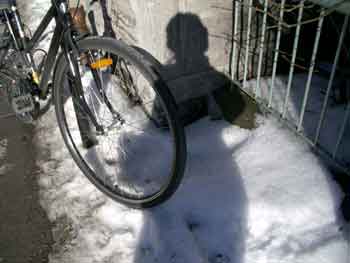
...back in the saddle again
Today is Cassandra's 2nd blogiversary, and she seems to have celebrated all weekend...
The party began with the early arrival (well, maybe "premature" would be a better word, I'm sure winter isn't done with us) of le printemps to Montreal and an excursion yesterday on my bike, with a long stop at Archambault where I searched for flute music in the extensive classical sheet music collection, then stopped for a cappuchino at my favorite cafe, where J. also arrived on his bike and looked in through the window to see me totally concentrated playing air piano over the score of a Bach flute sonata, while McGill students studied at the nearby tables.
The two of us took off for Cinema du Parc, up the street, and saw a new Chinese film called The World - about which more will be written later. After the movie we cycled home, had a fast dinner, and walked back to St. Laurent to attend the YULblog party at Zeke's Gallery, celebrating the fifth anniversary party of Montreal blogging (just to keep a measly two-year blog anniversary well in perspective). It was a loud, fun, rollicking party in a fairly small space; Cassandra was happy to see Mikel, Martine and Ed, Karl, Steph, and Helen again, and to meet Zeke, Andre and his wife, Chris, and Kate, aka la Blogeuse, for the first time. In this picture you can sort of see me and J., way in the back - J. is in a blue shirt, under the microphone hanging from the ceiling, and I'm to his right in the picture, smiling. (What this picture doesn't show is the saturation of the room with smoke - one thing I really don't like about Montreal is how many people smoke, and how it's allowed in certain areas of many public places. Afterwards I had to wash all my clothes and my hair, and this morning we both still had sore throats from the smoke and the shouting everyone was doing to carry on converstions over the din in the room. Which is all OK - it was a great party.)
Today we crawled out of bed rather reluctantly, and went to church for the Palm Sunday liturgy, which was very beautiful; then had lunch with a friend, came back and worked a bit, and in the late afternoon went to an organ and choir concert at Eglise St. Jean-Baptiste. The concert was disappointing; I had heard a fantastic concert of 19th century French organ music there earlier this month, but today's offering was a combination of well-performed but very contained and expressionless Renaissance music, sung by an a capella choir, and modern improvisations of his own composition played by Gabriel Marghieri, a decorated European organist who teaches improvisation at the University of Lyon. I was unfortunately left cold by the organ music, in particular, and was not alone in that reaction among the audience.
Maybe I should write something about two years of blogging, but nothing particularly new has come to mind, although I've thought about it a good deal this weekend. It's simply a part of my life now; as Andre and I were admitting last night, while our spouses pointed out observed symptoms and commiserated with each other.
As Paula wrote today, two years ago was the start of the Iraq war. I began my blog then to try to give myself an excuse to write about something other than the political issues that had been consuming me for the previous two years, and to lift myself out of the despair I felt. The same longing for peace and sanity exists in me today, maybe even more so, but I'm much happier and my life has literally changed, both because of the creative expression I've found here, and for having met all of you. Onward, with gratitude! Year Three!
8:20 PM
|
Saturday, March 19, 2005
Woman Leads Mixed-Gender Muslim Prayers
A BBC article reports on the controversial and potentially ground-breaking Friday prayer service which took place yesterday at facilities of the Episcopal Cathedral of St. John the Divine, in New York City, after local mosques refused to host it. Amina Wadud, a professor of Islamic studies at Virginia Commonwealth University, led the Friday prayers, which were attended by 80-100 Islamic men and women.
Another article, from the Chicago Sun-Times, is here, and includes this quote:
Some Islamic scholars have said they were aware of a few other mixed-gender prayer meetings led by women, mostly in the West, but they are rare.
''The issue of gender equality is a very important one in Islam, and Muslims have unfortunately used highly restrictive interpretations of history to move backward,'' Wadud said before the service. ''With this prayer service we are moving forward. This single act is symbolic of the possibilities within Islam.''
There was immediate criticism from Muslims who felt this was unacceptable; before westerners jump to conclusions, it's important to understand some of the reasons on both sides, which are covered somewhat in the articles.
12:49 PM
|
Friday, March 18, 2005
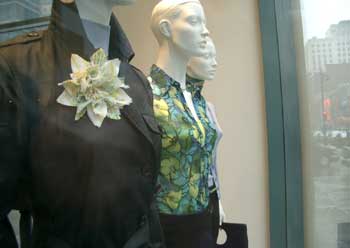
Getting warmer...
IN ANOTHER COUNTRY
Just three of many recent stories that show Toto this definitely isn’t Kansas. All of these news bits are gleaned from accounts in the Montreal Gazette, which unfortunately is not available free online in its entirety, or I'd give you the direct links.
Huge Student Strikes Protest Provincial Cuts in Education Aid
230,000 students went on strike, and nearly 100,000 of them marched this Wednesday in the biggest student protest in Quebec since the 1960s. The protests were in response to the Quebec government’s recent announcement of $103-million cut in student scholarships. I wish I could link to the electronic edition of yesterday’s Gazette and show you the photograph of the huge demonstration stretching as far up a Montreal street as you can see.
But get this: following in the footsteps of their elders, high school students have also been striking. 150 students from four high schools showed up as early as 6 a.m. on Wednesday to form a human chain surrounding their school building in Villeray. Unlike university and CEGEP (basically like a U.S. two-year college or technical school) students, Quebec law says that high school students are required to attend class. But their teachers refused to cross the picket line. Here’s the quote that really got me:
“On the other hand, teachers and administrators don’t want to discourage the students from being politically active,” said Claudette Lechasseur, a spokesperson for the Commission scolaire de Montréal. “The students are required to attend their courses,” Lechasseur said. “Except we realize these are important issues that will one day affect them directly. They’re learning an important lesson in citizenship.”
Big Business Loses in Court
The Supreme Court of Canada unanimously refused to overturn the Quebec government’s ban on butter-colored margarine. The suit had been brought by the international giant Unilever, saying that it costs the company $100,000 a month to have separate manufacturing and distribution processes for margarine designated for Quebec, which is the only place in the world still to have such a restriction.
“Quebec margarine, made in Toronto from Western-grown canola and Ontario soybean oil, is usually a lardish, pale cream colour because of a regulation that aims to protect Quebec’s huge dairy industry by eliminating potential confusion with butter.”
The Supreme Court ruled that the province did indeed have the right to protect its dairy industry.
Gay Activists Also Stage Protest
About 40 members of the Montreal queer activist group “the Pink Panthers” demonstrated in front of a conference center where Conservative Party leader Stephen Harper – an opponent of gay marriage and abortion - was appearing. They arrived in a vehicle topped with a papier-mache likeness of Stephen Harper in a, umm, homosexually compromising position with a pink panther. Some of the other protesters came dressed as bishops and pink pigs – the latter a comment on police brutality.
“His discourse is very homophobic, very anti-abortion, very pro-criminalization of sex work and pro-militarization. We’re sure he’s put on his best makeup for Quebec, and we want to strip him naked,” said Pantoufle, 28 (one of the organizers). The aim of the protest was to show delegates that the Québécois do not support Harper or his party’s policies, protesters said.
The demonstration seems to have been taken with good humor and it later disbanded peacefully, without incident or interference by police.
5:24 PM
|
Thursday, March 17, 2005
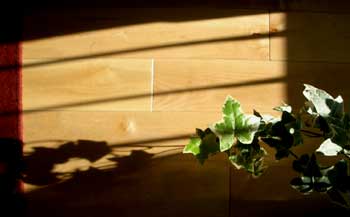
We're back in Montreal, as of yesterday evening. Life feels so much more tranquil here. I know - it's a city, what am I talking about? But it's true. And that's one of the impressions whose longevity I wonder about: will we always feel this way? Part of it is that this apartment feels like such a cozy nest, compared to our drafty, much larger wooden-frame Vermont house. Right now, there is jazz on the radio; J. is lighting a fire in the fireplace; the rice is cooking on the stove and the broiler is heating in preparation for a chicken breast glazed with apricot, dijon mustard and tamari. Cars go by, but I barely hear them; the streetlights reflect a pink glow off the snow.
This has been a demanding stretch of time, both workwise and personally. Basically things are fine, but there have been important meetings and potentially stressful discussions, all now in the past. As the one who had had the most sleep in the past few days, I drove yesterday, and arrived here with knots across my shoulders and a headache, both of which have eased away during the day today. Watching the fire reflect in the side of an old, carved wooden chest, I feel grateful for many simple things.

Readers interested in Thomas Merton might enjoy the post and subsequent discussion going on at The Vernacular Body (where yours truly has been hogging a good deal of airtime). For me, the discussion feels like it's resonating in the light of Umberto Eco's The Name of the Rose, recently re-read, which is ostensibly about an Italian monastery during the Inquisition, but is actually about lust of all kinds - including lust for power between competing institutions, and lust for knowledge contained in books. The comments, however, are about Merton's choice to remain in the monastery, bound by his bows of obedience - and how we might conceptualize that in terms of our own lives.

The music on the radio, post-dinner, has changed to a live recording from the Fribourg Festival of Sacred Music of medieval chant and chanson, with lute, drums, bells, and women's voices, and it is very wonderful; instrumental interludes interwoven with the sung portions. The fire dies down. And for some reason, I keep thinking of a blue bird I saw hopping happily in a cage in a neighbor's window today, high above the street.
6:41 PM
|
Tuesday, March 15, 2005
Montréal, ville plutôt sécuritaire
Montreal and the other major Canadian cities have recently been rated the safest North America cities. Montreal ranks further down, at 22nd place, for quality of life in this rating of the world's cities (but what do they know - and we probably got minus points for the weather!)The top cities in both categories were in Switzerland. (Article from Radio Canada, via Montreal City Weblog. In French)
Orchestra on Ice
Since I like classical music and am very happy to be in a city with so much excellent live music of all kinds, I've been following the stories about the engagement of Kent Nagano to be the next conductor of the Montreal Symphony Orchestra, beginning in 2006. But now there's drama, as always seem to be the case these days with major orchestras, opera, and dance companies - apparently the management of the orchestra and the musicians cannot arrive at a contract, and there is a possibility of a lock-out, right before Nagano is scheduled to conduct several concerts at the end of March and early April. Le Devoir has the story (also in French). (By contrast, I hope many of you read the fairly recent article about the Cleveland Orchestra and their new, young conductor Franz Welser-Möstin in The New Yorker; unfortunately it's not available online, but here's a review from the New York Times of their New York concert engagements last month, which included pianist Radu Lupu playing the five Beethoven piano concertos.)
1:09 PM
|
Monday, March 14, 2005

TWO SOLITUDES
Quebec Literature is a large and growing genre, and one that the province is justifiably proud of. But I'm just getting my feet wet, both in Canadian literature, and that of Quebec specifically. I've got several lists that bloggers and newspapers have published, and I noticed in La Presse that someone has just come out with a book about the 100 best Quebecois novels. But I want to ask for suggestions from you who know this literature very well - I'm trying to get a better picture, especially, of Quebec and Canadian history, both past and recent. For now, I'm probably better off with books that are in English translation but I'm gearing up to tackle more and more French. (And of course there are English-language originals on the list too.) Favorites, please?
Hugh MacLennan, born in Cape Breton, Nova Scotia in 1907, studied classics (like me); he did his undergraudate work at Dalhousie University, then went to Oxford as a Rhodes Scholar, and got his PhD at Princeton in 1935. He then taught at Lower Canada College in Montreal (does this still exist?), moving to McGill in 1951, where he taught for 30 more years; he died in 1990, probably wondering what on earth was going to happen to his city and to Quebec.
I didn't know about his teaching; just that he is an important Canadian writer. I read his first book, Barometer Rising, about the arms ship explosion in Halifax, a few years ago, and liked it very much. J. is halfway through Two Solitudes, MacLennan's classic book about rural French and Anglo Quebec in the first half of the 20th century, and I'm already stealing snatches of it when he's not reading. Mordecai Richler said that the book's title "entered into our language" as an expression for the Anglo/French cultural divide - he wrote that around 1990, when uncertainty about the province's future was very great and many English-heritage and English-speaking residents had fled to Ontario. The title actually comes from Rilke, and has a much more positive spin than Richler was able to read into it at the time. Although tensions between Anglo- and French culture still exist and can be felt even by newcomers like myself, I hope the Rilke fragment feels more plausible than it did fifteen years ago:
Love consists in this,
that two solitudes protect
and touch, and greet each other.
What I'm most looking forward to, in addition to the insights provided by MacLennan's narrative, is his prose. He's a really excellent descriptive writer; here's one of the opening paragraphs of the book, which begins in 1917:
Nowhere has nature wasted herself as she has here. There is enough water in the Saint Lawrence alone to irrigate half of Europe, but the river pours right out of the continent into the sea. No amount of water can irrigate stones, and most of Quebec is solid rock. It is as though millions of years back in geologic time a sword had been plunged through the rock from the Atlantic to the Great Lakes and savagely wrenched out again, and the pure water of the continental reservoir, unmuddied and almost useless to farmers, drains untouchably away. In summer the cloud packs pass over it in soft, cumulus, pacific towers, endlessly forming and dissolving to make a welter of movement about the sun. In winter when there is no storm the sky is generally empty, blue and glittering over the ice and snow, and the sun stares out of it like a cyclop's eye.
All the narrow plain between the St. Lawrence and the hills is worked hard. From the Ontario border down to the beginning of the estuary, the farmland runs in two delicate bands along the shores, with roads like a pair of village main streets a thousand miles long, each parallel to the river. All the good land was broken long ago, occupied and divided among seigneurs and their sons, and then among tenants and their sons. Bleak wooden fences separate each strip of farm form its neighbor, running straight as rulers set at right angles to the river to form long narrow rectangles pointing inland. The ploughed land looks like the course of a gigantic and empty steeplechase where all motion has been frozen. Every inch of it is measured, and brooded over by notaries, and blessed by priests.
Knowing how difficult it is to write that well, I look forward to reading 475 pages more.
3:14 PM
|
|
|